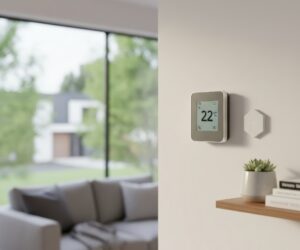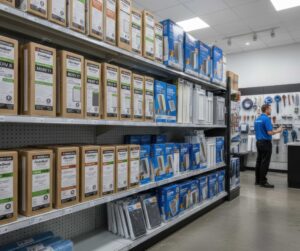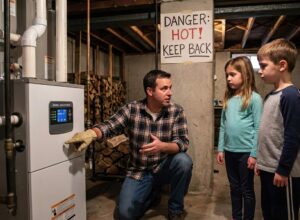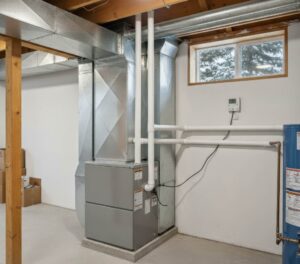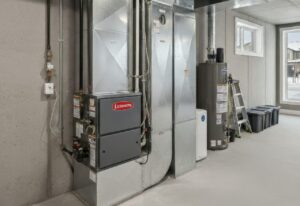The furnace filter is one area of furnace repairs and maintenance that homeowners should be able to look after without the need for a professional HVAC technician.
But changing an air filter takes a little know-how, especially the first time you attempt it. The most common mistake is attempting to place the air filter in the furnace in the wrong direction.
So, what direction does the furnace filter go?
Fortunately, furnace filters often have arrows marked on them to indicate airflow direction. The filter should be installed with the arrow pointing toward the direction of the airflow of the furnace.
In this article, we’ll look at how to correctly install a furnace filter, why it’s important to regularly change filters, and what might happen if these simple steps are neglected. We cover:
Does furnace filter direction matter?
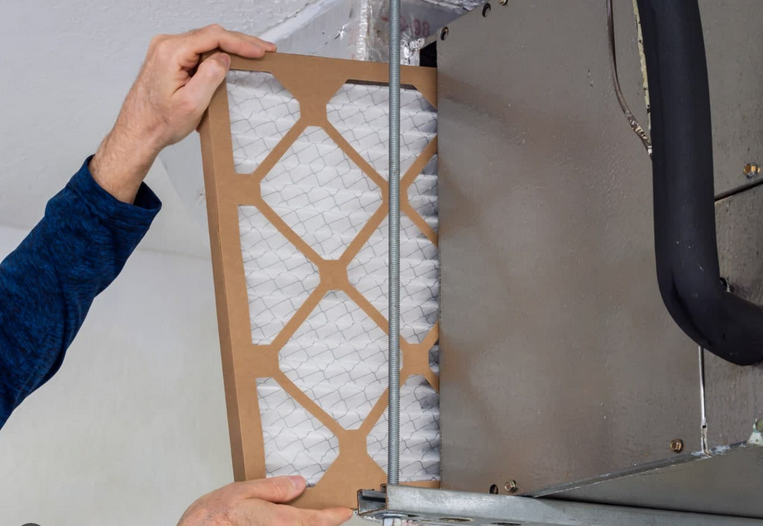
A furnace filter must be fitted the right way inside the furnace so that its efficiency is not impacted and your furnace is not damaged.
When you unpack a new filter, you’ll likely see an arrow marked on the filter frame. Insert the filter in the allotted space with the arrow pointing toward the direction of the airflow of the furnace, i.e., the arrow should face toward the furnace and away from the return duct that pulls the air into the furnace for heating.
If there are no arrows, consult the packaging or check with the manufacturer or an HVAC technician before inserting the new filter into the furnace. Typically, the air should flow through the side of the filter with metal or wire mesh.
How do you remember the airflow direction of a furnace filter?
The general rule is to “go with the flow”, which is a handy way to remember. The air in your home will then be properly filtered and maintain a healthy quality and flow through your furnace unit and your home.
You could even draw the airflow direction arrow with a permanent marker on the furnace or ductwork so that you have a visual reminder of the direction in which to install furnace filters.
How to replace a furnace filter properly
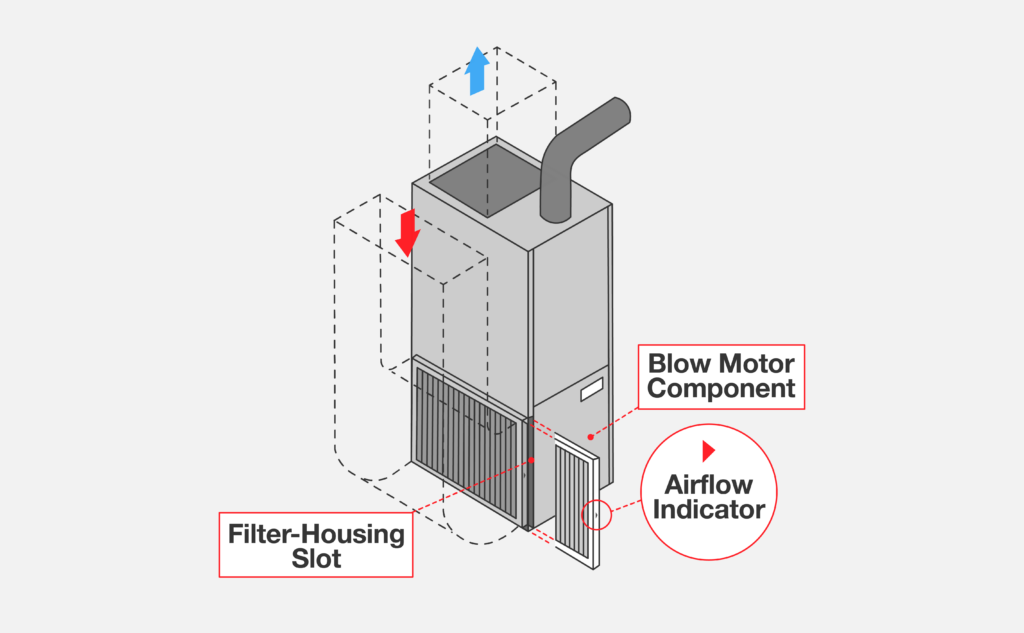
The primary function of a furnace filter is to prevent airborne particles such as dirt, dust, and pollen from entering your home’s heating system. If this happens, the furnace works less efficiently, often leading to poor indoor air quality in your home.
Disposable or washable filters?
Some furnace filters are cleanable and reusable while others are disposable and must be changed every 1-3 months. There may be no clear visual indicator to advise you which applies to your furnace filters. If you’re unsure, check with your HVAC installation company, the user manual or the filter manufacturer to confirm.
High-efficiency disposable filters are more common in Calgary, though they are the less eco-friendly and budget-friendly option. Some HVAC companies consider them more effective than washable electrostatic filters, especially at removing larger particles like pet dander. You can buy filters online or in hardware stress in packs of multiple units
Most high-efficiency disposable filters are highly effective, capturing up to 95 percent of larger airborne particles in the home. Their effectiveness is measured by the Minimum Efficiency Reporting Value (MERV rating) and the best filters are rated 9 to 12 MERV. Most reusable filters have a lower MERV rating than this.
Replacing furnace filters
Let’s assume that your furnace uses disposable filters. The furnace or the filter air box should contain the correct filter measurements for replacement filters or just check the dimensions on the filter itself when you’re ready to change it.
During the winter months in Calgary, you may find yourself having to change the furnace regularly (see next section).
During the winter months in Calgary, you may find yourself having to change the furnace regularly (see next section).
High-efficiency disposable filters are more common in Calgary, though they are the less eco-friendly and budget-friendly option. Some HVAC companies consider them more effective than washable electrostatic filters, especially at removing larger particles like pet dander. You can buy filters online or in hardware stress in packs of multiple units
Most high-efficiency disposable filters are highly effective, capturing up to 95 percent of larger airborne particles in the home. Their effectiveness is measured by the Minimum Efficiency Reporting Value (MERV rating) and the best filters are rated 9 to 12 MERV. Most reusable filters have a lower MERV rating than this.
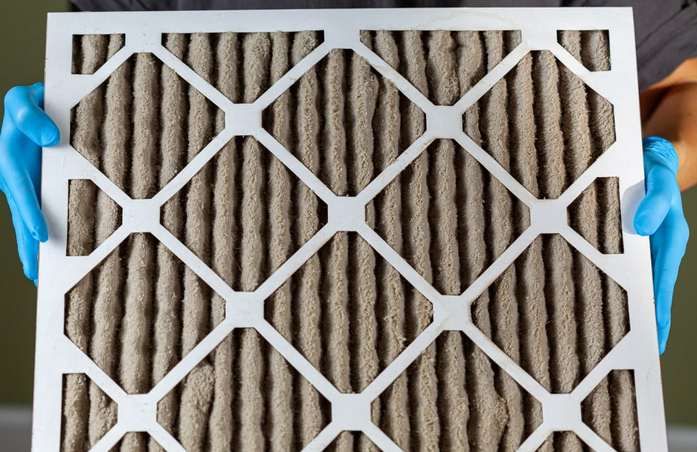
The first time you change the filter may be a little daunting but it’s not difficult. Follow these simple steps and you’ll have it by heart the next time:
- Locate the filter: it’s usually in the lower half of the furnace near where the ductwork meets the furnace, between the return duct and the air handler (a large metal box that houses the fan and its motor). It may be installed in a sliding compartment, inside the blower compartment or on a rack placed on the furnace’s side.
- Pull the old filter out and discard it: dispose of your old filter responsibly.
- Find the arrow on the new filter: you may need to rotate the filter until you find an arrow on the frame; this indicates the proper airflow direction for inserting the new filter.
- Slide the new filter into the air filter box with the arrow pointing toward the furnace: you might like to label the new filter with the date you changed it so that you can track when it will next need changing.
- Make sure you have a ready supply of new filters available: especially in the winter months when they need more regular changing (because the furnace works harder).
With the cost of a furnace such a major investment for most Calgary homeowners, taking these simple steps to maintain optimal performance should be a no-brainer.
Orientation and direction of different types of furnaces/filters
Not all furnaces (or filters) are made the same and, though the filter performs the same function in all makes and models, there are slight differences to note when changing the filters.
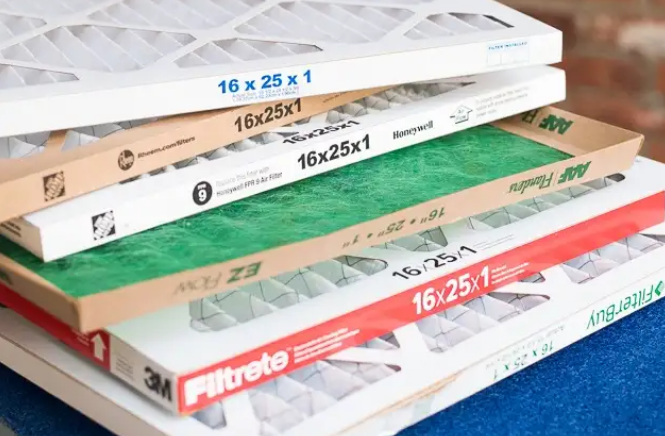
Disposable filters
Disposable filters are commonly made of fiberglass or pleated fabric with a cardboard frame. Identify the airflow direction by checking for arrows or markings on the filter frame. Install the filter with the arrow pointing in the direction of the airflow: generally, toward the furnace, air handler, and blower motor.
Reusable filters
Washable filters are usually made of aluminum or foam and rarely have specific airflow direction markings. If so, they can be installed either way in your furnace.
Electrostatic filters
Electrostatic filters often have specific installation instructions to follow and may or may not include an airflow direction indicator. Whatever the manufacturer’s instructions are, follow them.
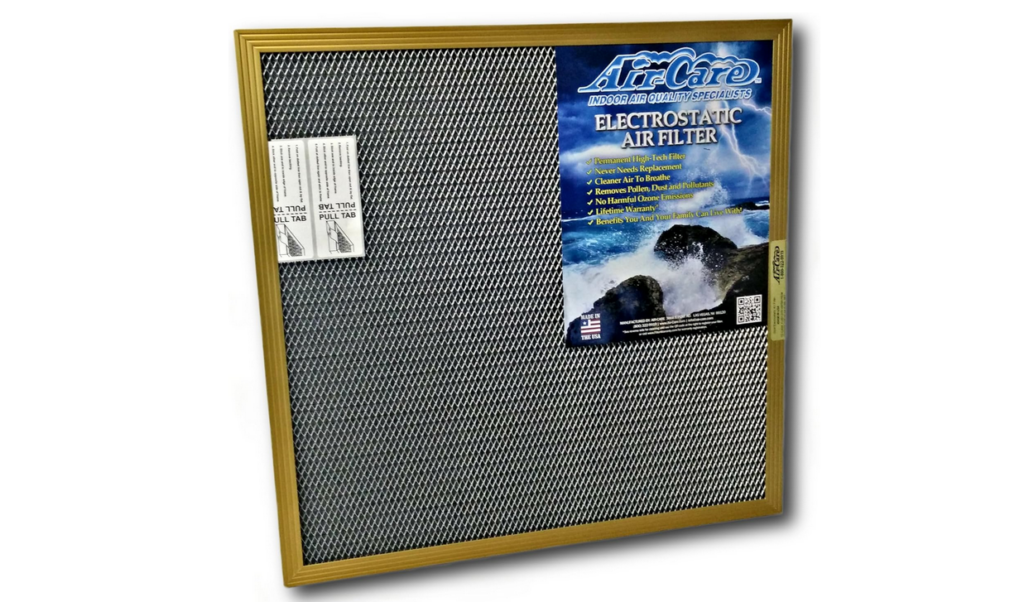
HEPA filters
Some homeowners in Calgary install high-efficiency particulate air (HEPA) filters to capture particles even more effectively. These filters generally have an airflow direction indicated on them but if not, install them according to manufacturer instructions.
Furnace types and filter orientation
The furnace filter is usually positioned near the intake air blower fan so that air flows through the filter and around the home. However, this may vary slightly between the different furnace types.
- Upflow furnace: the most popular type of furnace, found in the basements of most Calgary homes. The filter is usually positioned in the blower chamber near the bottom of the unit, right next to the cold air return. The filter arrow should point upwards.
- Downflow furnace: usually placed in the attic and the filter is positioned at the top of the blower’s upper chamber, with the arrows pointing down. Some downflow furnaces have a V-shaped filter system, with two filters installed at the same angle in the chamber.
Horizontal furnace: these furnaces generally incorporate a slide-in filter located on the side that draws cool air. The arrow should point in the direction the air is blowing.
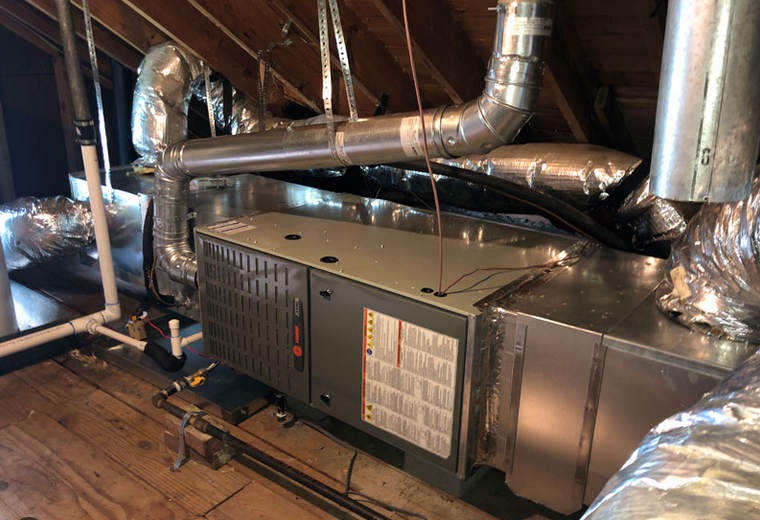
How often should you change furnace filters in Calgary?
The frequency with which you’ll need to change your furnace filters depends on the indoor air quality, how often the furnace is in use, whether the filters are reusable or not, etc.
Generally, for disposable filters in furnaces in Calgary homes during the coldest winter months, expect to change the filter every month or two. In the spring and autumn, you might need to change the filters every 2-3 months as your furnace will be less busy.
Routinely monitoring the filter and conducting visual inspections to see if it becomes clogged with dirt is an important furnace DIY maintenance task. If you hold the filter up to the light and can’t see through it, change it. If you’re unsure when to change your filter, an electronic air filter monitor might help.
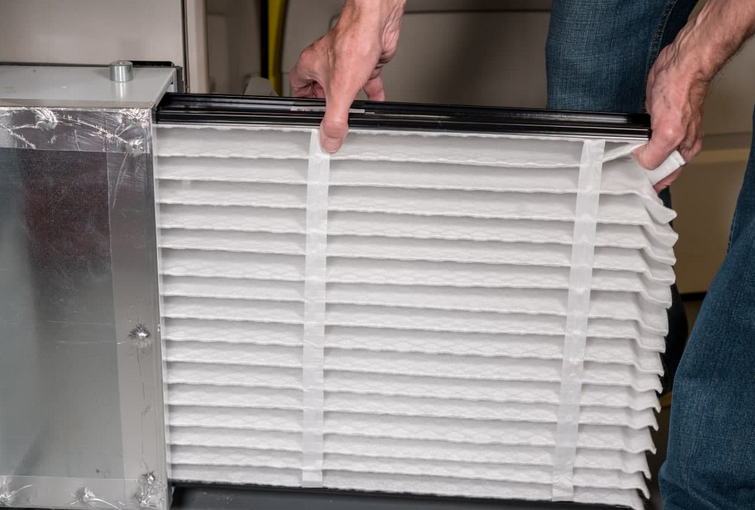
You should also book at least annual furnace maintenance from a certified HVAC professional to optimize indoor air quality and energy efficiency.
Why are filters so important for furnaces?
Dirty filters mean your furnace has to work harder to do its job. This places extra strain on the system, making costly breakdowns and furnace repairs more likely—along with higher energy bills.
An overworked heating system can affect the comfort levels of your family as well as your wallet. These are unnecessary problems when it’s so easy to change the filter and keep your furnace working optimally.
What happens if the furnace filter is the wrong way?
Three main things could happen if you install the furnace filter in the wrong direction (with the arrow pointing away from the furnace):
- It will be less effective at trapping dust and other airborne particles, harming the air quality in your home.
- It may reduce airflow, which will impact the efficiency of your heating system, making it work harder and consume more energy.
- Damage may be caused to the furnace.
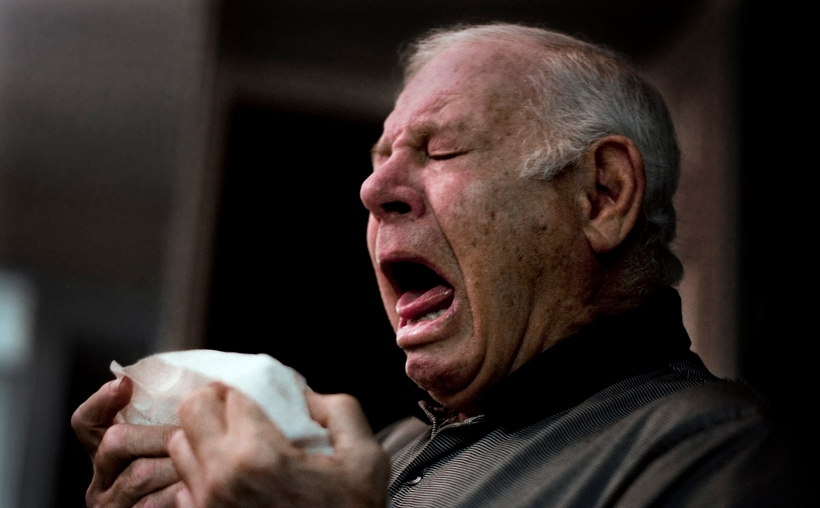
Ultimately, these issues can affect both your comfort levels and your wallet—with higher monthly bills and costly furnace repairs more likely.
How do I know if my furnace filter is installed the wrong way?
If something seems wrong with your furnace performance, checking the air filter is one of the main furnace troubleshooting tips.
Inspect the filter and if the arrow or markings on the filter point in the opposite direction of the airflow, reposition it the other way. This should restore normal airflow and efficiency.
If you’re unsure about your furnace filters…
It’s best to call a professional HVAC technician if you have any doubts about changing the filter in your furnace or any other aspect of furnace maintenance.
We provide year-round furnace tune-ups for all types and brands of furnaces in Calgary. All of our furnace professionals are SAIT-certified and highly trained to get the job done efficiently.
Call us at 403-236-4366 or contact us online to book furnace maintenance.
